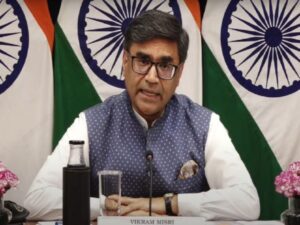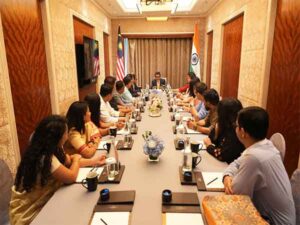UAE Gender Balance Council participates in Global Aviation Gender Summit in Madrid
Dubai [UAE], July 13 (ANI/WAM): The UAE Gender Balance Council (UAE GBC) participated in the Global Aviation Gender Summit 2023 organized by the International Civil Aviation Organization (ICAO) in Madrid, and focused on the enabling factors for achieving gender equality and empowering women in aviation.
This participation, which took place in coordination with the Delegation of the United Arab Emirates on the Council of ICAO, is an embodiment of the directives of Sheikha Manal bint Mohammed bin Rashid Al Maktoum, President of UAE Gender Balance Council, wife of His Highness Sheikh Mansour bin Zayed Al Nahyan, Vice President, Deputy Prime Minister and Minister of the Presidential Court, to strengthen the council’s global partnerships to achieve gender balance in the UAE alongside the participation of the countries of the world in the UAE’s pioneering experience in gender balance.
During its participation in the summit, headed by Huda Al Hashimi, Deputy Minister of Cabinet Affairs for Strategic Affairs at the Ministry of Cabinet Affairs and member of the UAE GBC, and with the participation of Ayat Al Salmi, Senior Project Manager in the UAE GBC, the Council delegation reviewed the UAE’s efforts to establish gender balance in all sectors and its regional and global achievements in this field; which are a translation of the vision of the wise leadership in support of women, to enhance their role as a significant partner in comprehensive development and an affirmation of the UAE’s commitment to the 2030 Sustainable Development Goals.
On the sidelines of the UAE GBC’s participation in the summit, Al Hashimi met with Salvatore Sciacchitano, President of the Council of the International Civil Aviation Organization (ICAO), and discussed areas of cooperation in a way that contributes to promoting gender balance at the regional and global levels. She emphasized the importance of the Global Accelerators Ambassadors Program which was launched last May at the organization’s headquarters in Montreal, Canada, with the aim of empowering the organization’s leaders with the accelerators’ tools and methodology to support ICAO’s gender balance goals and transformational vision.
The summit, which was held with the participation of governments, international organisations, experts and academics from the private sector, represented an excellent opportunity for dialogue on the current situation and prospects for expanding partnerships and strengthening measures by airlines and authorities, which will help achieve accelerated progress towards gender equality and enhance women’s participation in the industry in line with the fifth goal of the sustainable development goals related to the empowerment of all women and girls around the world – especially in light of the large current gap regarding the status of workers in the field of aviation by gender, according to a global survey conducted by the “ICAO” organisation. At the same time, it mentioned that there is a positive point despite this challenge, which is the increase in the percentage of women’s participation in general around the world in the positions of pilots, air traffic controllers and maintenance technicians from 4.5% in 2016 to 4.9% in 2021.
The summit stressed the importance of gender equality to create a more inclusive industry that provides opportunities to absorb new perspectives and ideas, and innovative and comprehensive solutions that work for everyone, making the aviation sector more competitive and resilient in facing future economic challenges. The summit sought to explore the enabling factors and solutions to achieve this goal, calling on stakeholders to work together to overcome the obstacles women and girls face to change the composition of the workforce in this sector.
Gender-responsive financing.
Al Hashimi participated as a keynote speaker in the session “Harnessing the power of gender-responsive policies and financing”, which focused on the importance of integrating a gender equality perspective into aviation policies, planning processes, strategies and frameworks.
The session looked at how to create an environment favourable to women in the aviation sector and the ways in which workplace culture can be changed through gender-responsive policies such as flexible working arrangements, promotion of work-life balance, implementation of inclusive and transparent human resources policies, with sufficient human and financial resources allocated to the implementation of these institutional arrangements in order to successfully address the gender gap.
In addition to Huda Al Hashimi, the session was attended by: Poppy Khoza, Director General, South African Civil Aviation Authority; Priscilla Mannis, Acting Head, Administration and Finance, OSCE Mission to Kosovo; Gema Martin del Burgo, President of the Ellas Vuelan Alto, which works to highlight female talent in the aviation sector; Katja Pehrman, Senior Adviser, UN Women, and Dr. Leslie Groves Williams, Senior Gender Equality and Leadership Consultant who moderated the panel discussion.
During her participation in the session, the Deputy Minister of Cabinet Affairs for Strategic Affairs at the Ministry of Cabinet Affairs and member of the UAE GBC, confirmed that the UAE is dedicating its efforts to enhance its successes in the aviation industry through its close relationship with the International Civil Aviation Organization, and said that part of these efforts is to ensure sharing knowledge about the Government Accelerators methodology and focusing on issues related to gender.
She also shed light on the UAE GBC, which was established in 2015 as a federal entity responsible for the gender balance agenda in the UAE to reduce the gender gap in all sectors including private and governmental levels and promote gender balance in leadership and decision-making positions, and promoting The UAE’s global competitiveness and making it a role model in this field.
She touched on the most prominent projects and initiatives launched and implemented by the Council to achieve these national goals, including the development of the “Gender Balance Guide” in cooperation with the Organisation for Economic Cooperation and Development (OECD).
As well as the study and review of laws and legislation related to gender balance and empowerment and women’s economy, where more than 22 new legislation and legal amendments were issued during the past years, covering the areas of work, protection, political participation, personal status, the judiciary, wages, banking transactions, freedom of movement, entrepreneurship, property and pension.
She indicated that women in the aviation sector in the UAE are at high rates, as approximately 27,000 women are currently employed in this sector, representing 42 per cent of the workforce, and that the General Civil Aviation Authority (GCAA) has worked to increase the percentage of women’s representation in leadership positions to 19 per cent in general in 2022 and to 21 per cent in technical specialities. The overall enabling environment in this sector has improved from 46 per cent in 2017 to 86 per cent in 2022, reflecting the efforts to provide a gender-friendly work environment.
She added that efforts to enhance women’s participation in the labour market extended to the UAE private sector to keep pace with the achievements made at the government level through the launch of the “SDG5 Pledge to Accelerate Gender Balance in the UAE Private Sector”, as the signatory companies voluntarily committed to increasing the representation of women in middle and senior management positions to 30 per cent as a minimum by 2025, and 64 companies operating in a range of sectors including aviation, financial services and energy have joined this initiative.
Al Hashimi shed light on the framework of the Gender Balance Index for the UAE, the criteria that were applied, and the methodology for evaluating the participating entities, stressing that honouring the figures and entities that win the index annually is part of the strategic plans in the country to achieve gender balance in all sectors and to inspire more institutions, and individuals to take practical steps.






